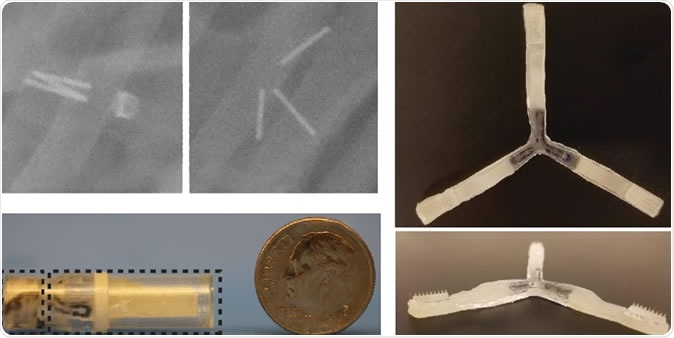Quite a few drugs such as insulin are made up of protein and hence can’t be taken internally, as the gut breaks them down, rendering them useless. Thus these have to be administered by injection, and in the case of drugs that have to be taken several times a day this is a definite limitation.
Now MIT engineers have come up with a novel drug capsule design that carries protein drugs on three folded arms within its protective coat, protecting them from digestive enzymes. Once the pill reaches the small intestine the coat dissolves to release the microneedles that are made of a soluble substance. These microneedles stick to the wall of the intestine to let the drug out, so it can be taken up by the small blood vessels in the gut lining. Their research is published in the journal Nature Medicine.

X-ray images at top left show the drug-delivery capsule in the intestine, before and after the arms expand. At right, the arms are unfolded to reveal the microneedles. Image Credit: MIT
Follow-up tests in pigs showed that the blood levels achieved by the use of the microneedle insulin pills were similar to those seen after an injection, which shows that the uptake is rapid enough to produce an immediate reduction in blood glucose. Also, the arms were passed out safely, and no pig showed features of intestinal obstruction. The absence of any risk for intestinal perforation was also confirmed both in pigs and in human gut lining samples treated under experimental conditions.
Researcher Robert Langer says, “We are really pleased with the latest results of the new oral delivery device our lab members have developed with our collaborators, and we look forward to hopefully seeing it help people with diabetes and others in the future.”
Why oral microneedles?
The researchers were motivated by the strong feeling against injections shared by both healthcare providers and patients. The advantages of oral pills are many. They are easy to take in general, can be stored at higher temperatures, and do not generate biohazard waste. The ability to deliver biologic medication (proteins, enzymes, nucleic acids, hormones, or antibodies) orally is highly desirable, but the problem is that these are often large molecules, that resist easy absorption by the intestinal cells. For this reason, the researchers developed the current oral capsule called the luminal unfolding microneedle injector.
The history of the microneedle injector pill
In older work, the researchers involved in the current study had already helped develop newer ways to deliver drugs which previously required injection by oral administration. For instance, one formulation consisted of a needle-coated pill, and another of a star-shaped pill which unfolds and persists in the stomach for up to a few weeks, releasing drugs all the while.
Another innovation was the capsule with a small needle made of compressed insulin. This would inject the insulin straight into the stomach lining once it reached the organ. This led to the current study aimed at achieving injection into the small gut lining.
Most drugs are maximally absorbed in this part of the gut because of the 250 square meters of surface area its unique architecture offers. The researchers also observe that this organ lacks pain receptors, so that the patient will not feel discomfort from the microinjections.
The capsule structure
The capsule is coated with a polymer capable of resisting the strong acid environment (pH 1.5 to 3.5) in the stomach. Once it passes out through the gastric outlet, it reaches the small intestine and is ‘uncurled’ by the more basic pH, around 6. This causes the trifold arms to spring into open position.
Each arm has microneedles contained in patches one millimeter long. These microneedles can contain the protein drug of choice. The spring action of the arms causes the microneedles to plunge into the most superficial layer of the small gut, allowing them to slowly dissolve and release the drug. The arms are strong enough to apply the microneedles quickly and firmly to the gut lining so that they stick, but also dissolve within a few hours so that they do not cause blockage. The broken-up arms are passed out of the gut later.
The penetration step was delicately fine-tuned by the scientists to ensure just the right depth of contact. Researcher Alex Abramson says, “We performed numerous safety tests on animal and human tissue to ensure that the penetration event allowed for drug delivery without causing a full thickness perforation or any other serious adverse events.”
Implications
This is a compelling paper, says expert commenter David Putnam, describing protein delivery as “the holy grail of drug delivery”. This could now be a very achievable task given this successful experimental proof-of-concept. Though tested using insulin, other hormones, enzymes and antibodies could also be delivered by this method, not to mentions drugs based on RNA. Oral vaccines are also a possibility.
Researcher Giovanni Traverso looks ahead: “We’re working very closely with our collaborators to identify the next steps and applications where we can have the greatest impact.”
Source:
Mit.edu. (2019). New capsule can orally deliver drugs that usually have to be injected. https://news.mit.edu/2019/orally-deliver-drugs-injected-1007
Journal reference:
A luminal unfolding microneedle injector for oral delivery of macromolecules. Alex Abramson, Ester Caffarel-Salvador, Vance Soares, Daniel Minahan, Ryan Yu Tian, Xiaoya Lu, David Dellal, Yuan Gao, Soyoung Kim, Jacob Wainer, Joy Collins, Siddartha Tamang, Alison Hayward, Tadayuki Yoshitake, Hsiang-Chieh Lee, James Fujimoto, Johannes Fels, Morten Revsgaard Frederiksen, Ulrik Rahbek, Niclas Roxhed, Robert Langer & Giovanni Traverso. Nature Medicine, volume 25, pages1512–1518 (2019). https://doi.org/10.1038/s41591-019-0598-9. https://www.nature.com/articles/s41591-019-0598-9#article-info